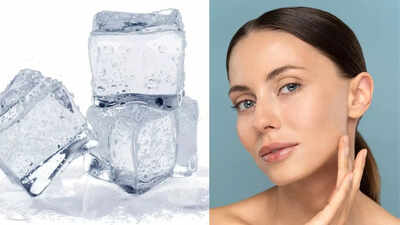Facial icing, also known as skin icing or cryotherapy, has surged in popularity across social media, touted for its potential therapeutic and aesthetic benefits. Proponents claim it can alleviate acne, reduce swollen eyes, and address various other skin concerns.

While cold therapy is a recognized treatment for injuries and pain management, the scientific community remains unconvinced about its specific advantages for facial skin. Despite the lack of substantial scientific evidence, many individuals believe in the efficacy of facial icing, fueling its rise as a prominent beauty trend. Further research is necessary to definitively establish its benefits for the skin.
According to experts, there are two common methods for incorporating ice into your facial routine:
Regardless of the chosen method, gently massage your face with slow, circular motions for approximately 1 to 2 minutes. Avoid prolonged direct contact of ice with your skin (over 2 minutes), as it may lead to irritation. This circular massage can be incorporated into your daily routine, targeting areas such as:
Prior to embarking on ice facials, seeking personalized advice from a healthcare or skincare professional is recommended. Consider these tips:
Regularly change the ice and wrapping to minimize the spread of bacteria. Remember that icing should complement, not replace, your existing skincare regimen.
Several factors contribute to the rising popularity of ice facials:
Prolonged or improper facial icing can potentially lead to:
Individuals with pre-existing health conditions like diabetes or Raynaud's syndrome should exercise caution or consult a doctor before trying facial icing, as it may exacerbate existing sensitivities or nerve issues.
Facial icing offers several potential benefits:
While these benefits show promise, further research is required to validate the direct impact of facial icing on puffiness and acne.
Disclaimer: This content is for informational purposes only and does not constitute medical or dermatological advice. Skin types and conditions vary. Always consult a dermatologist before starting new skincare routines.
 Blackcaps and White Ferns Face Packed Home Summer Against Cricket Heavyweights
Blackcaps and White Ferns Face Packed Home Summer Against Cricket Heavyweights
 Gambhir Defends India's Tailenders After Headingley Collapse; Cites Dropped Catches as Key Factor in Test Loss
Gambhir Defends India's Tailenders After Headingley Collapse; Cites Dropped Catches as Key Factor in Test Loss
 England Captain Stokes Lauds Duckett and Crawley for Blistering Start in Record Chase Against India
England Captain Stokes Lauds Duckett and Crawley for Blistering Start in Record Chase Against India
 Hair Oil vs. Serum: Which Elixir is Right for Your Hair Type? A Comprehensive Guide
Hair Oil vs. Serum: Which Elixir is Right for Your Hair Type? A Comprehensive Guide
 7 Proven Habits to Nail Your Next Job Interview: Project Confidence and Authenticity
7 Proven Habits to Nail Your Next Job Interview: Project Confidence and Authenticity
 Ogimi's Secrets: 3 Life-Extending Lessons From Japan's Village of Longevity
Ogimi's Secrets: 3 Life-Extending Lessons From Japan's Village of Longevity
 Facial Icing: Hype or Help? Benefits, Risks, and Safe Application of This Viral Beauty Trend
Facial Icing: Hype or Help? Benefits, Risks, and Safe Application of This Viral Beauty Trend
 Suryakumar Yadav's Sensational Catch: Rohit Sharma Reveals T20 World Cup Turning Point
Suryakumar Yadav's Sensational Catch: Rohit Sharma Reveals T20 World Cup Turning Point